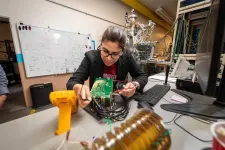(Press-News.org) WhatsApp can be a highly effective tool to help older people overcome loneliness and depression, according to the findings of a study conducted in Guarulhos, the second-largest city in São Paulo state, Brazil.
An article on the study is published in the journal Nature Medicine. The co-corresponding author is Marcia Scazufca, a scientific researcher at Hospital das Clínicas (HC), the hospital complex run by the University of São Paulo’s Medical School (FM-USP), and a professor at the school.
“This was a randomized controlled trial involving 603 participants aged more than 60 and registered with 24 primary care clinics belonging to the SUS [Sistema Único de Saúde, Brazil’s national public health network]. They were positively screened for depression and displayed significant symptoms of the disorder. They were randomly divided into two groups. The intervention group, with 298 participants, received WhatsApp messages via the Viva Vida program twice a day, four days a week, for six weeks, with educational content on depression and behavioral activation. The control group, with 305 participants, received a single message with educational content. Neither group received support from healthcare professionals,” Scazufca explained. The name of the program, Viva Vida, means “Long Live Life”.
The average age of the participants was 65.1. Women were a large majority (74.8%). Although 603 people were initially recruited, only 527 (87.4%) completed the follow-up assessment. Symptoms of depression improved in 42.4% of the intervention group, compared with 32.2% in the control group. “This suggests that intervention in the form of mobile phone messages was an effective short-term treatment of depression for older people in areas with limited health services,” she said.
Selection of participants was based on answers to Patient Health Questionnaire-9 (PHQ-9), a widely validated screening tool used to assess the presence and severity of depression based on a scale from 0 to 27, with 0-4 indicating absence of depression, and 5-9, 10-14, 15-19, and 20-27 indicating mild, moderate, moderately severe and severe depression respectively.
“We invited everyone with a score of 10 or more in the initial assessment to participate, so that our sample included people with moderate as well as severe depression,” she said.
Because many low-income elderly Brazilians are semi-literate or illiterate, the intervention group received three-minute audio messages or images but no text messages. The researchers took care to use simple language inspired by popular radio programs. Two actors, pseudonymously Ana and Léo, read the messages, which evolved from educational phrases about depression to guidance on behavioral activation and advice on avoiding a relapse.
“The difference of 10 percentage points between the intervention and control groups in terms of improvement may seem small, but considering the very low cost of Viva Vida and the very large proportion of the population it could potentially reach, these 10 pp could represent millions of people. Moreover, Viva Vida should be seen as a first step, which can be combined with other forms of intervention. It’s important to note that that vast majority of the participants had never received treatment of any kind for depression, and hadn’t even been diagnosed as depressed,” Scazufca said.
The result is especially relevant in a middle-income country like Brazil, where the number of older people is rising fast and mental health services are scant, she added. The low cost of the program and the ease with which it can be implemented means it can be replicated in other countries with similar or worse socioeconomic conditions and where conventional treatment is unavailable or unaffordable for many. “As we continue this type of research, we may find even stronger evidence of the benefits of digital mental health intervention and of extending the coverage of psychosocial treatment globally,” she said.
The study was supported by FAPESP via scholarships awarded to several members of the team (projects 18/19343-9, 22/05107-7, 21/04493-8, 20/02272-1, 20/14768-1, 20/14504-4, 21/04230-7, 21/10148-1, 22/08668-0 and 21/03849-3).
About São Paulo Research Foundation (FAPESP)
The São Paulo Research Foundation (FAPESP) is a public institution with the mission of supporting scientific research in all fields of knowledge by awarding scholarships, fellowships and grants to investigators linked with higher education and research institutions in the State of São Paulo, Brazil. FAPESP is aware that the very best research can only be done by working with the best researchers internationally. Therefore, it has established partnerships with funding agencies, higher education, private companies, and research organizations in other countries known for the quality of their research and has been encouraging scientists funded by its grants to further develop their international collaboration. You can learn more about FAPESP at www.fapesp.br/en and visit FAPESP news agency at www.agencia.fapesp.br/en to keep updated with the latest scientific breakthroughs FAPESP helps achieve through its many programs, awards and research centers. You may also subscribe to FAPESP news agency at http://agencia.fapesp.br/subscribe.
END
Use of WhatsApp messages by public health service to treat depression in older people produces results, study shows
With simple audio messages and images, the Viva Vida program produced significant improvements in over-sixties living in a major city in metropolitan São Paulo (Brazil). An article on the study is published in Nature Medicine.
2024-06-11
ELSE PRESS RELEASES FROM THIS DATE:
Special issue on “Safety and intelligent maintenance of offshore structures” by China Ocean Engineering
2024-06-11
The ocean, rich in mineral resources such as oil, natural gas, polymetallic nodules, cobalt-rich ferromanganese crusts, polymetallic sulfides, and rare earth ore, plays an increasingly important role in resource development and economic growth. It is also regarded as an essential strategic space for sustainable development with abundant wind, wave, tidal, and solar energy. Compared with onshore structures, however, offshore structures, being complex, bulky, and expensive, have to endure various random loads that change over time and space, including wind, waves, currents, tides, sea ice, and even coupled with ...
Cognitive test is poor predictor of athletes’ concussion
2024-06-11
When college athletes are evaluated for a possible concussion, the diagnosis is based on an athletic trainer or team physician’s assessment of three things: the player’s symptoms, physical balance and cognitive skills.
Research published today suggests that almost half of athletes who are ultimately diagnosed with a concussion will test normally on the recommended cognitive-skills test.
“If you don’t do well on the cognitive exam, it suggests you have a concussion. But many people who are concussed do fine on the exam,” said Dr. Kimberly Harmon, the study’s lead author. She is a professor of family medicine ...
Buck researchers explore how the immune system goes awry during space travel and the implications for human aging on earth
2024-06-11
As long as humans have been traveling into space, astronauts have experienced significant health effects from the extreme conditions of space flight, notably the reduction of gravity.
Two Buck scientists led a team that has revealed for the first time how the lack of gravity affects the cells of the immune system at single cell resolution. As co-senior authors, along with Christopher E. Mason, PhD of Weill Cornell Medical College, Associate Professor David Furman, PhD and Associate Professor Daniel Winer, MD, published in the ...
Social determinants of health linked with youth-onset prediabetes
2024-06-11
Food insecurity, low household income and not having private health insurance are associated with higher rates of prediabetes in adolescents, independent of race and ethnicity, according to a new JAMA Network Open study by University of Pittsburgh and UPMC researchers.
The findings suggest that screening for social determinants of health — the non-medical factors that influence a person's health and risk of disease — may help identify youth at risk of prediabetes, which could ultimately improve early interventions that prevent progression to type 2 diabetes.
“This study underscores the importance ...
Harvard, Google DeepMind researchers create realistic virtual rodent
2024-06-11
The agility with which humans and animals move is an evolutionary marvel that no robot has yet been able to closely emulate. To help probe the mystery of how brains control movement, Harvard neuroscientists have created a virtual rat with an artificial brain that can move around just like a real rodent.
Bence Ölveczky, professor in the Department of Organismic and Evolutionary Biology, led a group of researchers who collaborated with scientists at Google’s DeepMind AI lab to build a biomechanically realistic digital model of a rat. Using high-resolution data recorded from ...
Scientists unlock secrets of how the third form of life makes energy
2024-06-11
Scientists unlock secrets of how the third form of life makes energy.
An international scientific team has redefined our understanding of archaea, a microbial ancestor to humans from two billion years ago, by showing how they use hydrogen gas.
The findings, published today in Cell, explain how these tiny lifeforms make energy by consuming and producing hydrogen. This simple but dependable strategy has allowed them to thrive in some of Earth’s most hostile environments for billions of years.
The paper, led by Monash University Biomedicine Discovery Institute scientists, including ...
Would astronauts’ kidneys survive a roundtrip to Mars?
2024-06-11
The structure and function of the kidneys is altered by space flight, with galactic radiation causing permanent damage that would jeopardise any mission to Mars, according to a new study led by researchers from UCL.
The study, published in Nature Communications, is the largest analysis of kidney health in space flight to date and includes the first health dataset for commercial astronauts. It is published as part of a Nature special collection of papers on space and health.
Researchers have known that space flight causes certain health issues since the 1970s, in the ...
Depressive symptoms may hasten memory decline in older people
2024-06-11
Depressive symptoms are linked to subsequent memory decline in older people, while poorer memory is also linked to an increase in depressive symptoms later on, according to a new study led by researchers at UCL and Brighton and Sussex Medical School.
The study, published in JAMA Network Open, looked at 16 years of longitudinal data from 8,268 adults in England with an average age of 64.
The researchers concluded that depression and memory were closely interrelated, with both seeming to affect each other.
Senior author Dr Dorina Cadar, of the UCL Department of Behavioural Science & Health and Brighton and Sussex Medical School, said: “It is ...
New technique could help build quantum computers of the future
2024-06-11
Quantum computers have the potential to solve complex problems in human health, drug discovery, and artificial intelligence millions of times faster than some of the world’s fastest supercomputers. A network of quantum computers could advance these discoveries even faster. But before that can happen, the computer industry will need a reliable way to string together billions of qubits – or quantum bits – with atomic precision.
Connecting qubits, however, has been challenging for the research community. Some methods form qubits by placing ...
Trash-sorting robot mimics complex human sense of touch
2024-06-11
WASHINGTON, June 11, 2024 – Today’s intelligent robots can accurately recognize many objects through vision and touch. Tactile information, obtained through sensors, along with machine learning algorithms, enables robots to identify objects previously handled.
However, sensing is often confused when presented with objects similar in size and shape, or objects unknown to the robot. Other factors restrictive to robot perception include background noise and the same type of object with different shapes and sizes.
In Applied Physics Reviews, by AIP Publishing, researchers from Tsinghua University worked to break through the difficulties ...
LAST 30 PRESS RELEASES:
Breaking the efficiency barrier: Researchers propose multi-stage solar system to harness the full spectrum
A new name, a new beginning: Building a green energy future together
From algorithms to atoms: How artificial intelligence is accelerating the discovery of next-generation energy materials
Loneliness linked to fear of embarrassment: teen research
New MOH–NUS Fellowship launched to strengthen everyday ethics in Singapore’s healthcare sector
Sungkyunkwan University researchers develop next-generation transparent electrode without rare metal indium
What's going on inside quantum computers?: New method simplifies process tomography
This ancient plant-eater had a twisted jaw and sideways-facing teeth
Jackdaw chicks listen to adults to learn about predators
Toxic algal bloom has taken a heavy toll on mental health
Beyond silicon: SKKU team presents Indium Selenide roadmap for ultra-low-power AI and quantum computing
Sugar comforts newborn babies during painful procedures
Pollen exposure linked to poorer exam results taken at the end of secondary school
7 hours 18 mins may be optimal sleep length for avoiding type 2 diabetes precursor
Around 6 deaths a year linked to clubbing in the UK
Children’s development set back years by Covid lockdowns, study reveals
Four decades of data give unique insight into the Sun’s inner life
Urban trees can absorb more CO₂ than cars emit during summer
Fund for Science and Technology awards $15 million to Scripps Oceanography
New NIH grant advances Lupus protein research
New farm-scale biochar system could cut agricultural emissions by 75 percent while removing carbon from the atmosphere
From herbal waste to high performance clean water material: Turning traditional medicine residues into powerful biochar
New sulfur-iron biochar shows powerful ability to lock up arsenic and cadmium in contaminated soils
AI-driven chart review accurately identifies potential rare disease trial participants in new study
Paleontologist Stephen Chester and colleagues reveal new clues about early primate evolution
UF research finds a gentler way to treat aggressive gum disease
Strong alcohol policy could reduce cancer in Canada
Air pollution from wildfires linked to higher rate of stroke
Tiny flows, big insights: microfluidics system boosts super-resolution microscopy
Pennington Biomedical researcher publishes editorial in leading American Heart Association journal
[Press-News.org] Use of WhatsApp messages by public health service to treat depression in older people produces results, study showsWith simple audio messages and images, the Viva Vida program produced significant improvements in over-sixties living in a major city in metropolitan São Paulo (Brazil). An article on the study is published in Nature Medicine.



